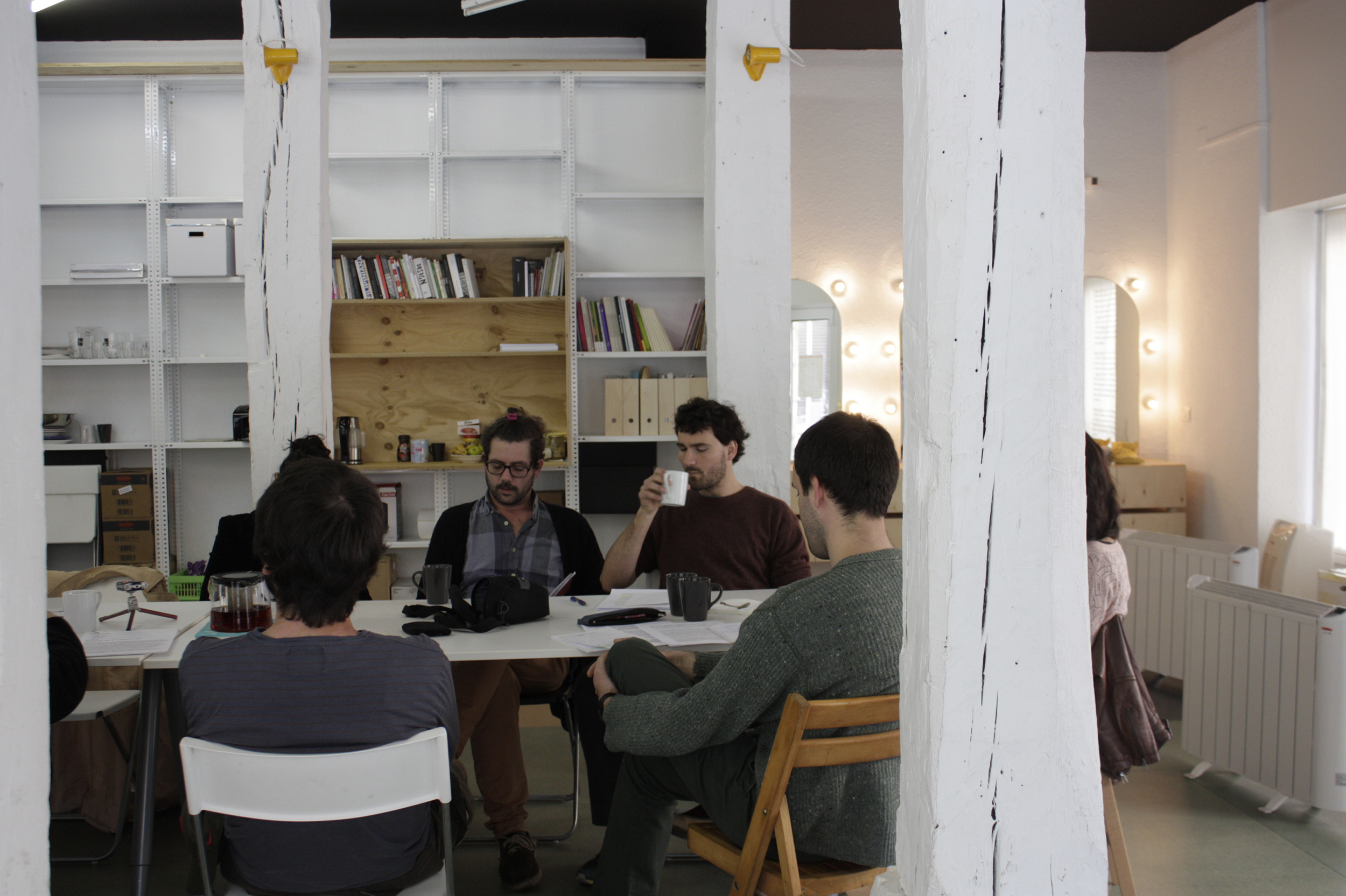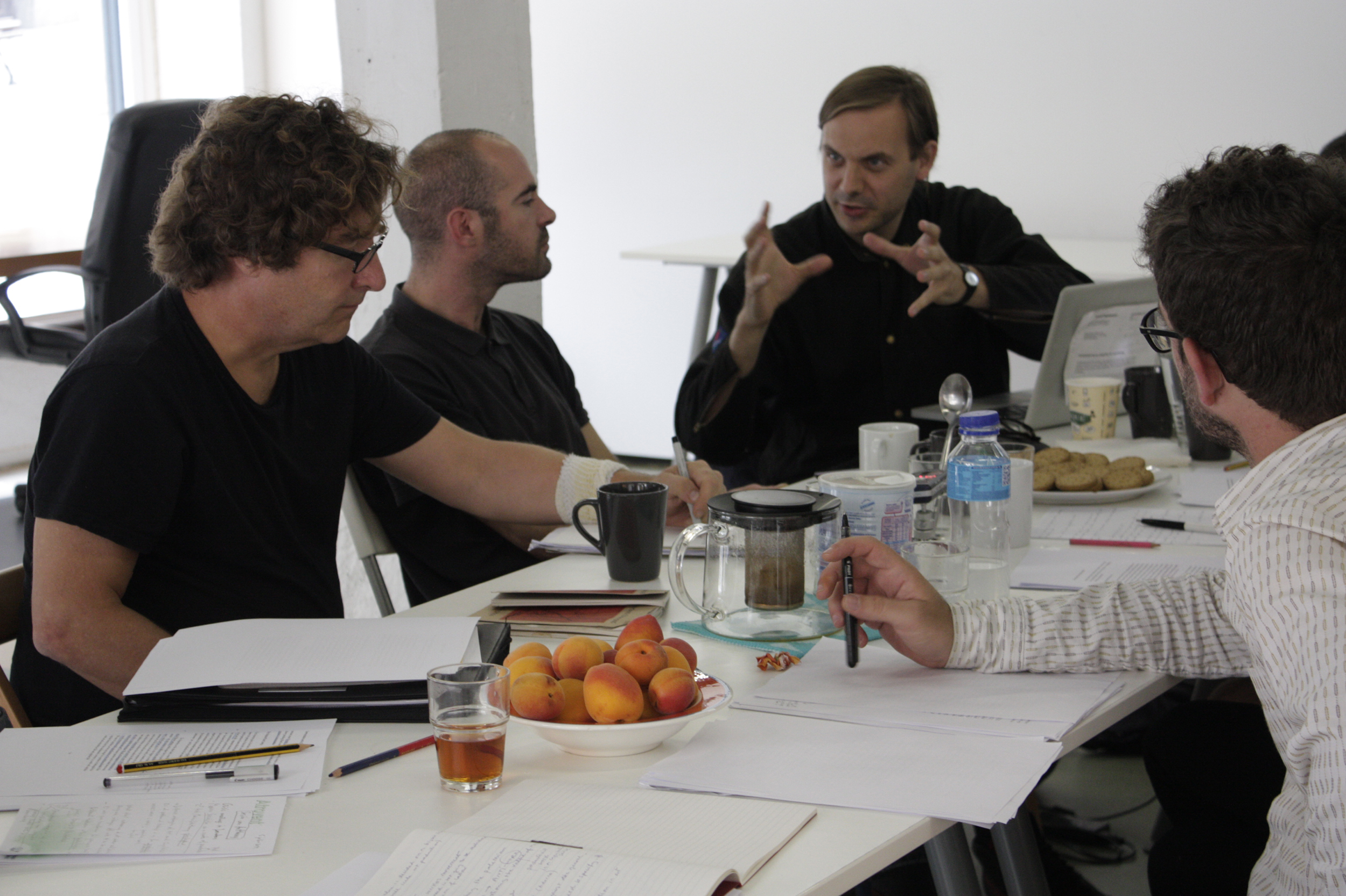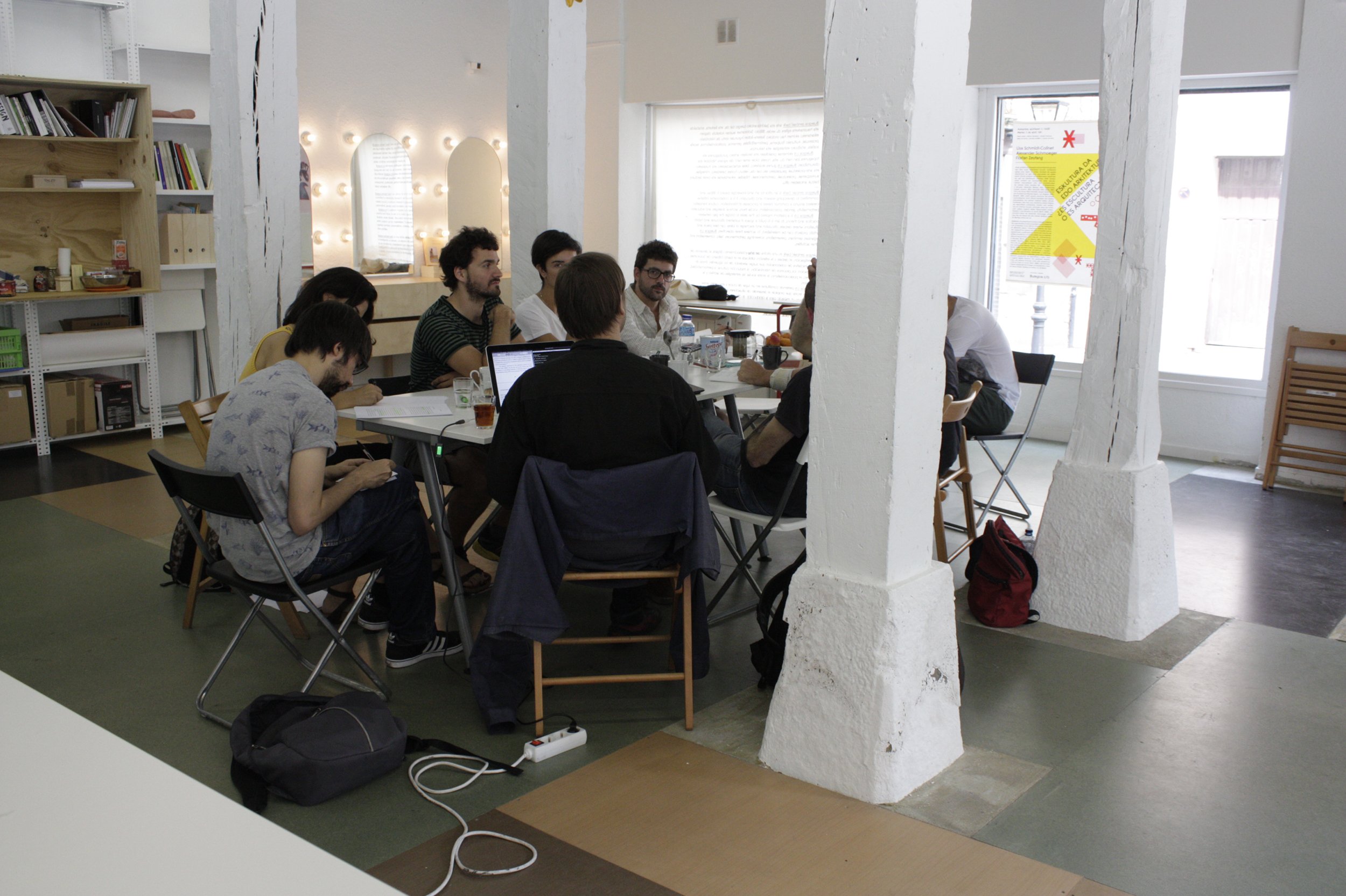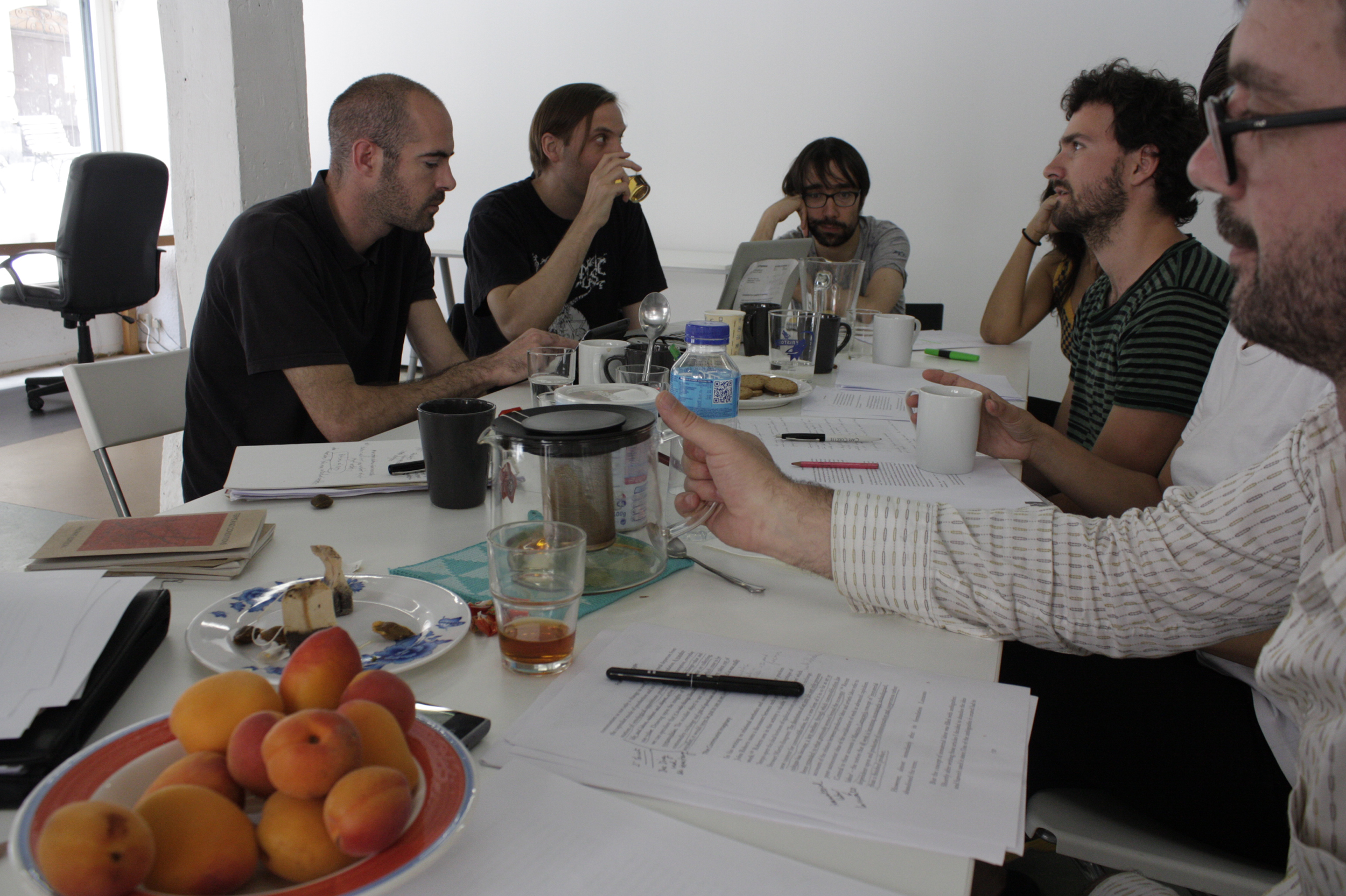BGE, Reading groups
“What is to be done under Real Subsumption?”. Workshop and meeting
by
“Revolution cannot be the mere expropriation of capital, the seizing of the means of production by or on behalf of the working class. It must be the direct destruction of the self-reproducing relation in which workers, as workers — and capital, as self-valorising value — are and come to be. The revolution will be Communist, or it will not be. We call the revolution thus conceived ‘Communisation’.”
Endnotes: “Crisis in class relations”
In April this year, we started up a reading group in order to think about certain aspects of the present that preoccupy us. Our intention when we began was to search for a better understanding of capitalism in its current state, and to ask what kind of politics are actually critical, desirable and effective under real subsumption. We also tried to explore the implications and consequences of such politics for contemporary art practices. “Wandering Abstractions,” a recent text by philosopher Ray Brassier, was the starting point for a series of readings and discussions. The text analyses and calls into question theoretical considerations of Communization and Acceleration, two heterodox tendencies in current Marxism that try to rethink the present. Although both of these tendencies are Marxist in their premises, they also call into question the idea of the proletariat as revolutionary subjects under real subsumption. Communization differs here to how it is used by Tiqqun or Comité Invisible, being closer to the theoretical approach of collectives such as Théorie Communiste, Endnotes, Blaumachen, Riff-Raff and SIC- International Journal for Communisation.
The meeting, which will take place between the 28th and 30th November, will continue to develop the reading group’s previous reflections. Participants: Federico Corriente, Anthony Iles, Rob Lucas and Zoe Sutherland (Endnotes), Anna O’Lory (SIC), Marina Vishmidt and Ray Brassier. The meeting is coordinated by Loty Negarti and Mattin and will be held in English. Live video streaming at TV-tron ( http://www.tea-tron.com/teatron/TVTRON.do)
To take part in the meeting, please write to bulegoa@bulegoa.org
An introductory text written by Loty Negarti and Mattin can be read here.
PROGRAM:
Friday, 28th November
19.00 – 21.00. “Spain and the Origins of Communization Theory: From the Far-Left to Today”. Federico Corriente. In Spanish (text will be also available in English)
Saturday 29th November
10.30 – 11.30. “This Implies Nothing”. Anthony Iles
11.30 – 12.30. “Procedures of Abolition: and several paradoxes they throw up”. Marina Vishmidt
12.30 – 13.30. Discussion
13.30 – 15.30. Lunch break
15.30 – 16.30. “Keepsakes”. Anna O’Lory
16.30 – 17.30. Video or written response by Ray Brassier
17.30 – 18.30. “False totalities don’t have exits”. Zoe Sutherland and Rob Lucas
18.30. Discussion
Sunday 29th November
11.00-14.00. Final Reading Group Session with participants in the reading group and speakers.
“Spain and the Origins of Communization Theory: From the Far-Left to Today”. Federico Corriente
There are three parts to this text. The first part discusses the origins of Communization theory in the historical Far-Left; the second considers relations between the first communizers (Dauvé, in particular), with the MIL (Iberian Liberation Movement) and the Etcétera group; and finally, it takes a brief look at the current situation in Spain with regard to the dissemination of Communization theory.
“This Implies Nothing”. Anthony Iles
Subsumption has recently entered into casual use. People… everything… are just so subsumed nowadays! Really really subsumed in fact. In the past alienation and reification had similarly become catch all terms for contemporary malaise, losing their specificity. Alienation foremost describes the separation of the worker from the products of her labour and consequently her own activity itself. This basic premise and subsequent extension of alienation through capital’s intensification of processes of autonomisation is sufficiently abhorrent. Extending, or projecting, this concept into an existential framework is perhaps unnecessary. The proposition that subsumption is ‘both ‘complete’ and a ‘constantly continuous, and repeated revolution’ points to capital as a dynamic, rather than an unfolding history of stages of domination. In this session I will discuss how Theodor Adorno’s productive (mis)understanding of subsumption and reification led him to theorise a widely misunderstood concept of the autonomy of art. In this context I will discuss the heteronomy of art and the problematic prospects for its abolition under conditions of real subsumption.
“Keepsakes”. Anna O’Lory
This text is a response to Ray Brassier’s essay, Wandering Abstraction, from one of the varied perspectives around the communisation problematic, as expressed in the journal Sic. It does not intend to respond on behalf of Endnotes, the main target of his critique, but rather its concern is to discuss the modernist elements of his text which, it is argued here, pose obstacles to a deeper criticism of capitalist social relations.
“Procedures of Abolition: and several paradoxes they throw up”. Marina Vishmidt
In this talk, we will consider a short history of the currency of ‘self-abolition’ in radical political thought and practice, and consider how the constitution of this ‘self-‘ has taken on different inflections in materialist feminism, the black radical tradition and in communisation theory and its interlocutors. The notion of self-abolition has been both an enabling paradox and a stumbling block for attempts to theorize struggle both within the horizon of existing antagonisms and through, or around, their limits.
“False totalities don’t have exits”. Zoe Sutherland & Rob Lucas
The only thing that has ever been really subsumed by capital is the labour process, and this subsumption first occurred at the origins of the specifically capitalist mode of production; real subsumption and capital proper are more or less identical. Since those origins, capital’s subsumption of the labour process has advanced, and sometimes retracted, in uneven patterns across the globe. Attempts to think about real subsumption in some broader or epochal sense may be linked to a simple ontologisation of social reality grounded in a false totalisation by which the social whole is pictured as a singular entity of which capital or one of its avatars is implicitly taken to be the essence. An effect of such ontologisation is that questions of historical change — origin, periodisation or revolutionary overcoming — become metaphysical aporias. These aporias can have all the charm of traditional theological puzzles, consuming endless quantities of intellectual energy. But such puzzles are games we don’t always need to play.
BIOGRAPHIES:
Ray Brassier teaches philosophy at the American University of Beirut. Recent publications include: “Conversation with Suhail Malik” in Realism Materialism Art, C. Cox, J. Jaskey, S. Malik (eds.), Berlin: Sternberg, forthcoming. A Speculative Autopsy. Postscript on Peter Wolfendale’s Object-Oriented Philosophy: The Noumenon’s New Clothes (Urbanomic, Falmouth, 2014). “Prometheanism and its Critics” in Accelerate: The Accelerationist Reader, A. Avanessian and R. Mackay (eds.), Falmouth and Berlin: Urbanomic/Merve Verlag, 2014; “Genre is Obsolete” in M. and A. Iles (eds.) Noise and Capitalism, Donostia, San Sebastian: Arteleku Audiolab, 2009. Nihil Unbound: Enlightenment and Extinction (Palgrave MacMillan, Basingstoke, 2007).
Federico Corriente (Cairo, 1965) is a translator, who has translated works by Guy Debord, Alèssi dell’Umbria, Lewis Mumford, William Morris, Henry James, Oscar McLennan and Irvine Welsh, among others. He has been the principal translator of texts from proponents of Communization into Spanish, particularly by the Endnotes collective.
Anthony Iles is a writer of criticism and fiction based in London. He is a PhD candidate at Middlesex University, a contributing editor with Mute / Metamute and an editor of the forthcoming publication Anguish Language, http://anguishlanguage.tumblr.com/
Rob Lucas is a member of the Endnotes group.
Anna O’Lory is a member of SIC (International Journal for Communisation)
Zoe Sutherland is a member of the Endnotes group.
Marina Vishmidt is a London-based writer, editor and critic occupied mainly with questions around art, labour and value. She is the author of Speculation as a Mode of Production (Brill, early 2016) and A for Autonomy (with Kerstin Stakemeier) (Textem, late 2014). She also writes often with Anthony Iles and with Melanie Gilligan. Together with artist Melissa Gordon, she edits a feminist art journal (LABOUR, PERSONA, the WE Voice). She often collaborates with artists and contributes to journals including Mute, Afterall, Texte zur Kunst, ephemera, South Atlantic Quarterly, Parkett, and OPEN! as well as co-/edited collections and catalogues, most recently Anguish Language (Archive Books, forthcoming). A chapter by her is included in The Routledge Companion to Art and Politics (forthcoming). She teaches Theory at the Dutch Art Institute, and has lectured at the University of the Arts, Berlin, Central Saint Martins, Goldsmiths, and the Royal Academies in Copenhagen and Stockholm. Vishmidt also has a long-term involvement with artists’ moving image in critical and exhibition contexts such as the feminist film distributor Cinenova, and Full Unemployment Cinema.











